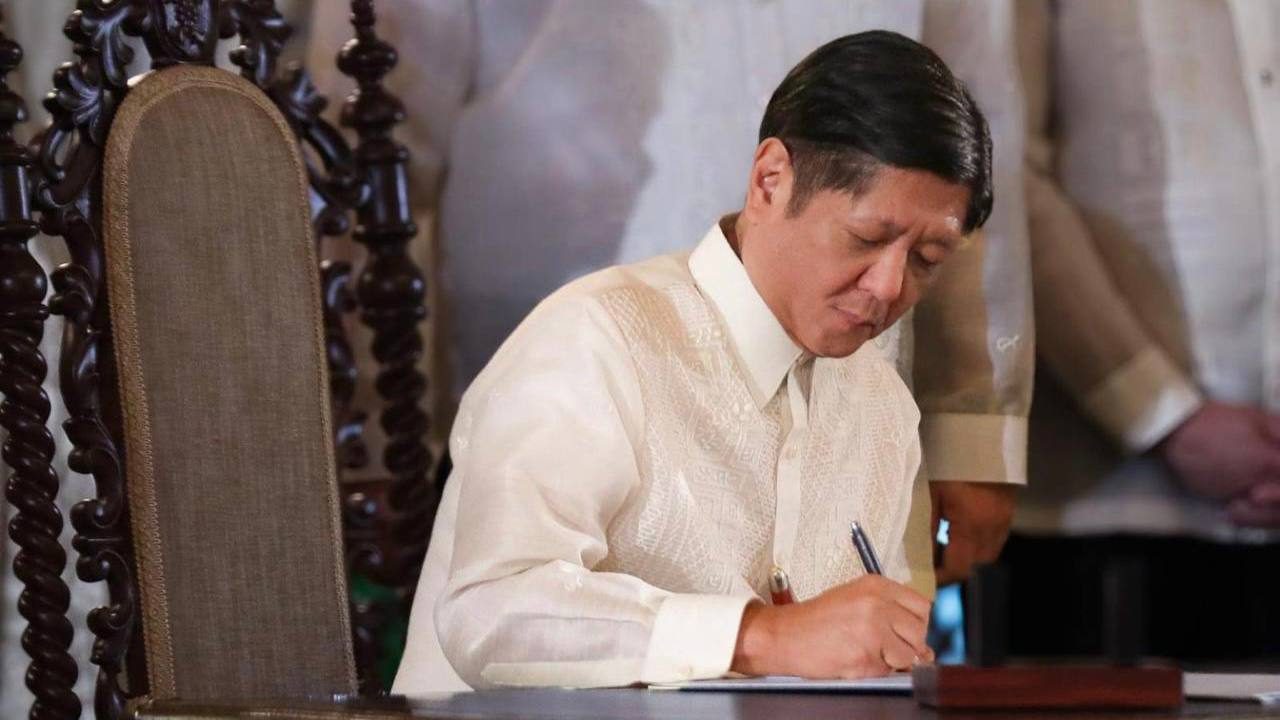SUMMARY
This is AI generated summarization, which may have errors. For context, always refer to the full article.

MANILA, Philippines – President Ferdinand Marcos Jr. signed on Monday, December 9, a bill amending the Agricultural Tariffication Act, to allow the Department of Agriculture (DA) secretary to declare food security emergency when there is rice supply shortage or “extraordinary increase” in prices.

“In cases of sudden rice shortages or price hikes, the DA will now be empowered to take the necessary actions to stabilize the market. This will help ensure that the price of rice remains affordable and accessible to every Filipino,” Marcos said on Monday during the ceremonial signing of Republic Act 12708 at Malacañang.
Prior to a declaration of food security emergency, the DA secretary is to be advised by the National Price Coordinating Council. This body is supposed to create a formula and determine when shortage in supplies or abnormal increase in prices happens.
Aside from declaring a food security emergency, the DA can also sell rice buffer stocks in areas hit by these crises and import rice when locally produced rice is not enough.
A total of P5 billion from any source of unutilized fund in the DA will be used to buy rice during food security emergencies. Excess tariffs from imported rice not exceeding P2 billion will also be allocated to this buffer fund.
Marcos vetoed these provisions on the buffer fund, saying these are “inconsistent with the principles of sound fiscal management” because the unutilized funds or the excess tariffs will not go back to the National Treasury.
“With much consternation, I feel that certain provisions of the bill may bring unfavorable results than their perceived benefits,” the President wrote in his veto message to Congress dated December 6.
With these new responsibilities, the DA will have “stricter oversight of the rice industry,” the President said. The Bureau of Plant Industry “will also be able to inspect rice warehouses and manage a national database to track grain storage, safeguarding our food supply and ensuring its safety for the public.”
Tracking and inspecting warehouses and cold storage facilities are crucial links in the supply chain, and are aspects that are in need of better government oversight.
Extension of RCEF
The law also extends the implementation of the Rice Competitiveness Enhancement Fund (RCEF) up to 2031 and increasing annual allocation from P10 billion to P30 billion.
RCEF, also called as the Rice Fund, is set to expire in 2025. This fund comes from the taxes collected from imported rice.
“This will enable us to do much more for our farmers, ensuring that they have the resources that they need to succeed and to make the rice industry even more competitive,” said Marcos.
RCEF is created to support seed and mechanization programs and in the process, reduce prices and post-harvest losses.
Marikina 2nd District Representative Stella Quimbo said the extension comes in a timely manner “as rice tariff collections have reached a record high of over P30 billion this year, ensuring the resources needed to sustain these programs.”
Out of the P30 billion annual allocation, P6 billion will go towards distribution of high-quality rice seeds, while P9 billion will go to the farm mechanization program.
Jayson Cainglet, executive director of farmers’ group Sinag, said that increased support and funding can help drive rice prices down. The group welcomed the extension of the RCEF.
“Only through increasing public support and providing additional incentives to our farmers in reducing cost of production and increasing palay yield, can we truly reduce rice prices,” Cainglet said.
Meanwhile, P15 billion will be for training, financial and credit assistance, and projects on irrigation and water impounding, among others.
“The increased funding to enhance the rice industry’s competitiveness will boost both rice yields and farm output, benefiting millions of farmers and their families, as well as millions of poor Filipino consumers who need more affordable rice,” DA Secretary Francisco Tiu Laurel said. – Rappler.com
Add a comment
How does this make you feel?














There are no comments yet. Add your comment to start the conversation.